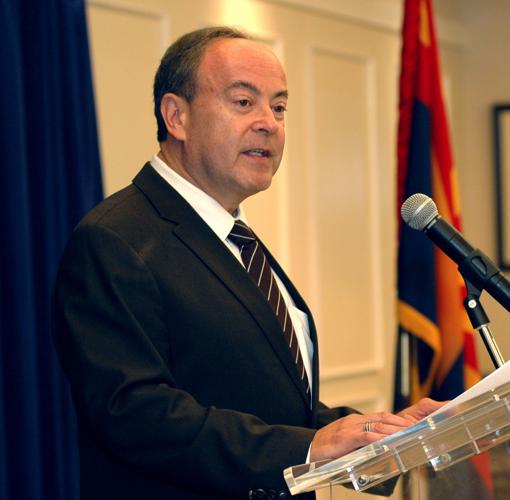PHOENIX — The state cannot deny the opportunity of accused rapists to seek release on bail even if the proof is evident before trial that the person committed the crime, the Arizona Supreme Court ruled Friday.
In a 4-3 decision, the justices overturned a 2002 voter-approved state constitutional amendment that said bail must be denied when someone is accused of certain sexual offenses.
Justice Ann Scott Timmer, writing for the majority, said the U.S. Supreme Court has concluded that pretrial detention without bail is permissible only when there is a “legitimate and compelling” purpose and that the restriction is narrowly focused. She and three other justices said that means defendants are entitled to be released pending trial when there is no showing they will be a danger to the community, despite what Arizona voters approved.
But Justice Clint Bolick, in a stinging dissent for himself and two other justices, chided his colleagues for voiding the decision by voters to keep those accused of rape locked up following their arrest.
“Sexual assault is by definition a uniquely horrific act, in which a person’s most intimate parts are violated through force, coercion, or deception,” he wrote.
Bolick also pointed out that the 2002 measure requires a judge to deny bail in these kinds of cases only when the prosecution first shows that “the proof is evident or the presumption great” that the defendant did, in fact, commit the crime. And he said that is not a huge burden, as the time someone is detained without bail “will only be temporary.”
But Timmer said that’s not the issue or the standard.
“The question here is not whether sexual assault is a deplorable crime that endangers and dehumanizes victims,” she wrote. “It is and it does.”
The question, Timmer said, is whether even if there is great proof of someone’s guilt whether that person “will pose an unmanageable risk of danger if released pending trial.” And she said even data cited by prosecutors about recidivism rates of convicted rapists after release from prison do not provide a basis for categorical denial of bail.
Timmer said courts can impose restrictions on those released to protect public safety, such as requiring their movements to be monitored by global positioning system devices.
Maricopa County Attorney Bill Montgomery said it was wrong for the court to overturn the entire voter-approved state constitutional amendment.
“The Supreme Court has decided that some citizens’ initiatives are worth more deference that others,” he said.
Montgomery acknowledged the U.S. Supreme Court precedent on bail, but said the Arizona justices are “hypersensitive to federal court rulings in this area.”
He also said if the justices believe the facts in this case did not merit holding the defendant without bail, they could simply have said that. But instead, Montgomery said, they came back with a sweeping decision that will affect all future cases.
Friday’s ruling involves Guy Goodman, who was charged last year with sexually assaulting a victim in 2010.
A police officer testified that Goodwin, a guest in the victim’s home after a night of socializing, touched her while she was sleeping and without her consent. The officer also said Goodman, when confronted with DNA evidence, confirmed the sexual assault.
At a pretrial hearing, Kevin Wein, a Maricopa County court commissioner, said while there was evidence that Goodman committed the offense, prosecutors failed to show that he poses a “substantial danger to other persons or the community.” And at least part of that was based on the fact there was no evidence he had committed similar crimes in the seven ensuing years or threatened the victim.
Instead, the commissioner set bail at $70,000, required electronic monitoring of his movements and imposed other conditions like not possessing any weapons.
Last year, the Court of Appeals overturned that decision, leading to Friday’s Supreme Court review.
Timmer said one problem with the 2002 ballot measure is it does not provide any procedures to determine whether someone charged with rape would pose a danger if allowed out on bail.
“Second, nothing shows that persons charged with sexual assault, or even a significant number, would likely commit another sexual assault or otherwise dangerous crime pending trial if released on bail,” she said, even while acknowledging it would be difficult to prove that.
What prosecutors did provide, Timmer said, are recidivism rates among sex offenders. But she brushed these aside as they concern a wide variety of sex crimes beyond rape.
About the closest meaningful data, she said, was a report that 5.6 percent of those convicted of rape reoffend within five years after release from prison. And another study said that only 3 percent of rapists on bail were arrested for any other felony while awaiting trial.
Bolick was unconvinced, saying the Arizona constitutional provision is very narrowly focused on preventing danger to the community. And he said even the U.S. Supreme Court has concluded that rapists “are likely to commit similar crimes in the future.”
Goodman eventually pleaded guilty while this case was pending. But the court agreed to take up the issue based on the likelihood that the legal questions about the 2002 ballot measure would reoccur.





